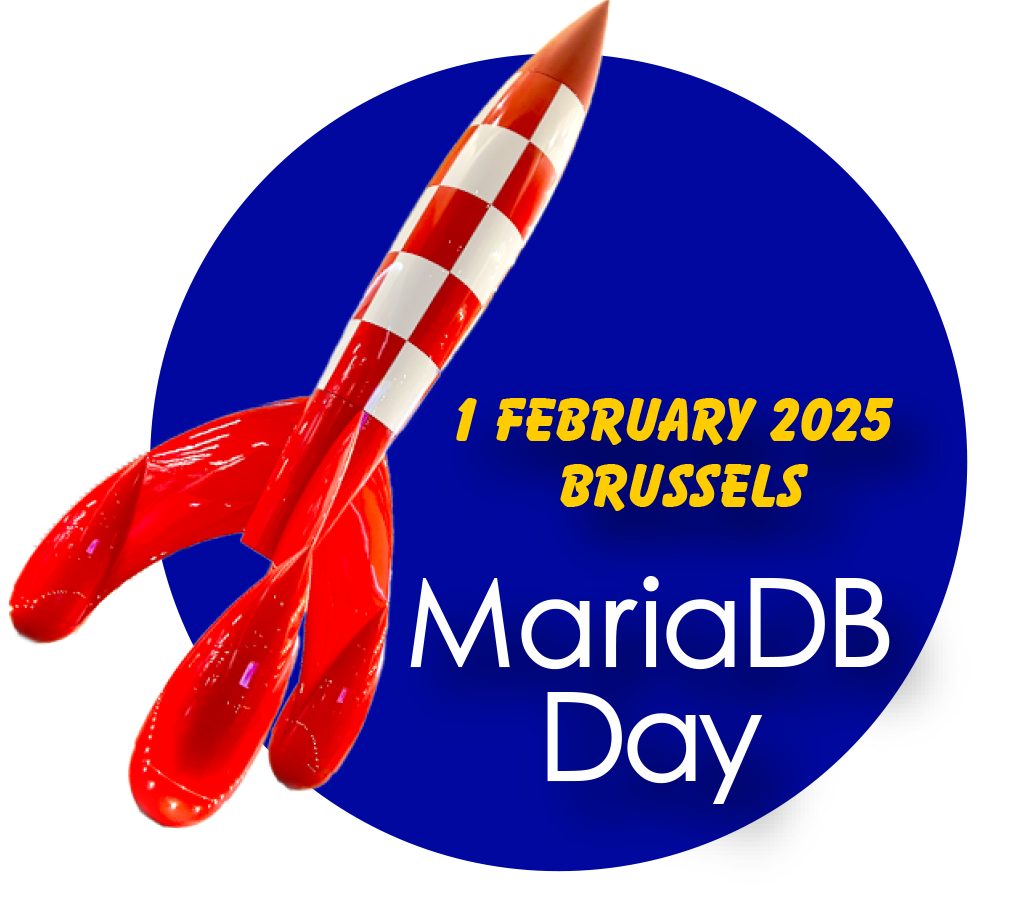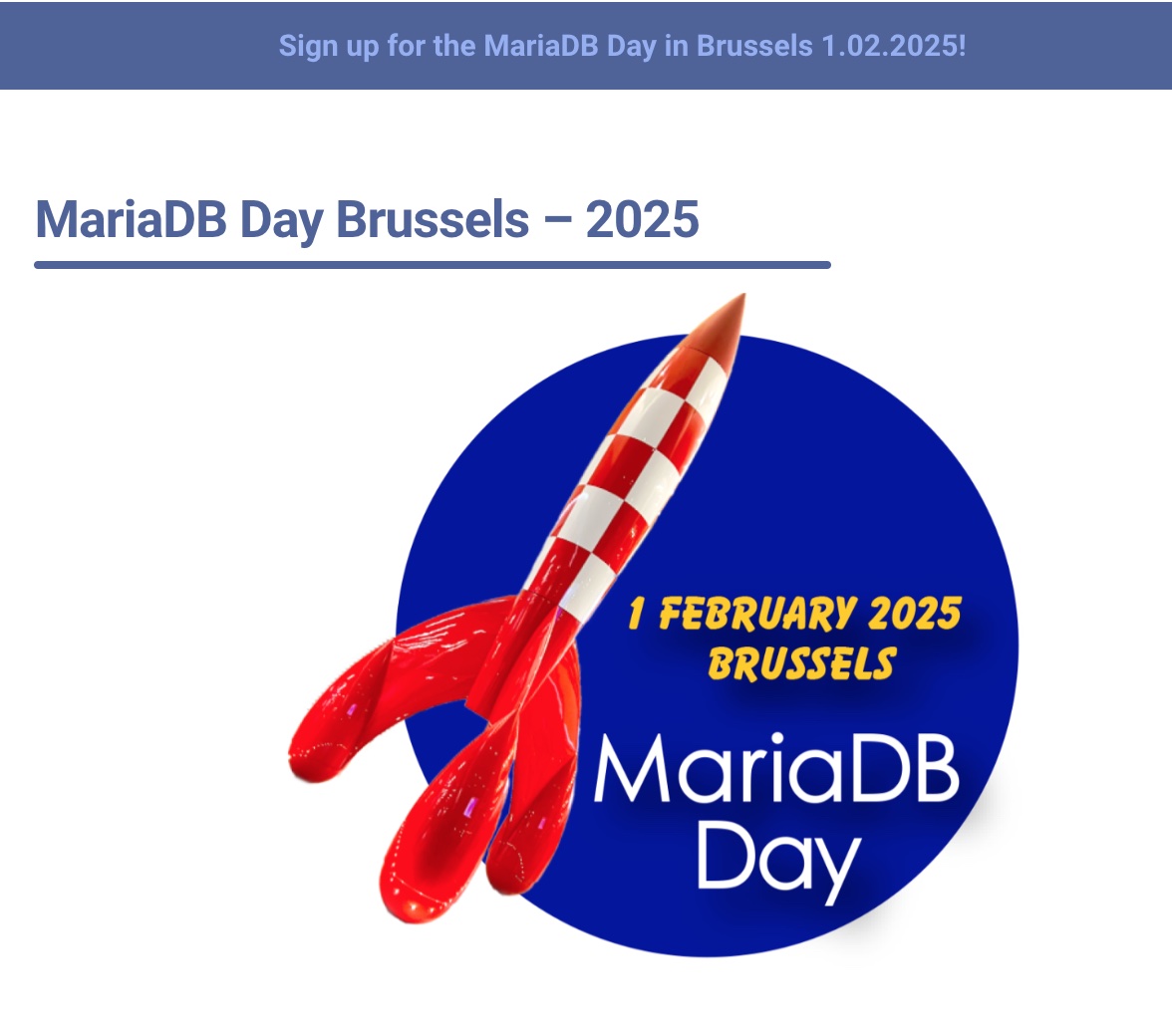The MariaDB Foundation is pleased to announce the availability of MariaDB 11.4.5, MariaDB 10.11.11, MariaDB 10.6.21 and MariaDB 10.5.28, the latest stable releases in their respective long-term series (maintained for five years from their first stable release dates).
See the release notes and changelogs for details.
Release Notes Changelog What is MariaDB 11.4?
Release Notes Changelog What is MariaDB 10.11?
…
Continue reading “MariaDB 11.4.5, 10.11.11, 10.6.21 and 10.5.28 now available”
Still unsure about attending the MariaDB Day in Brussels on Saturday? Here are four reasons to turn up at our FOSDEM Fringe event.
1. Discover blazingly fast Vector search
Learn how to power your latest AI app with MariaDB Vector. Mark Callaghan has been testing its performance and the results are amazingly fast compared to Postgres’ pgvector. Check out part 1, part 2 and part 3 of his blog.
2. Meet the people behind MariaDB
At MariaDB Day you will find several people from MariaDB Foundation, Company and partners: Sergei Golubchik, Vicențiu Ciorbaru, Otto Kekalainen, Peter Zaitsev, Kristian Nielsen, Roman Nozdrin, Jags Ramnarayan, Diego Dupin and Kaj Arnö.
…
Continue reading “Four reasons to visit MariaDB Day in Brussels”
Here comes the Q4 2024 contributions report. The raw data which contains also statistics until today can be found on GitHub, here.
Server contributions
Just like last quarter, I’m going to start with a breakdown of all the organisations who have contributed to MariaDB Server during 2024.
| MariaDB Plc. | 31 | 1707 |
| MariaDB Foundation | 9 | 201 |
| Codership | 7 | 103 |
| Amazon | 12 | 51 |
| Independent | 19 | 48 |
| GSoC | 3 | 14 |
| Arch Linux | 1 | 6 |
| Alibaba | 1 | 4 |
| IONOS | 1 | 4 |
| Workato | 1 | 4 |
| Rakuten | 1 | 3 |
| OpenBSD | 1 | 2 |
| HardenedBSD | 1 | 2 |
| University of Sydney | 1 | 2 |
| Arm | 1 | 1 |
| ClearCode | 1 | 1 |
| FreeBSD | 1 | 1 |
| IBM | 1 | 1 |
| NetBSD | 1 | 1 |
| Chainguard | 1 | 1 |
| CloudLinux | 1 | 1 |
| TOTAL | 96 | 2158 |
MariaDB Server contributions for from 1st January 2024 – 31st December 2024
We can see some new names compared to the Q3 2024 report, with contributions from CloudLinux, NetBSD and Workato.
…
Continue reading “MariaDB Contribution Statistics, January 2025”
Time to sign up! The schedule is out for our first 2025 MariaDB Day, in Brussels 1 Feb 2025.
And what a schedule it is, with insightful presentations by top-brass presenters.
The latest new features
First of all, this is the opportunity to get the big picture of the latest new features in MariaDB.
- Peter Zaitsev of Percona gives an external overview of the “Splendidly wonderful features in MariaDB 11” – looking forward to another one of his top-rated presentations!
…
Continue reading “Register for MariaDB Day Sessions 1 Feb 2025”
Here are the results of a recent poll on LinkedIn and mariadb.org about the popularity of a few of the major replication features (I aggregated the results from the two sites):
What is your favorite MariaDB replication feature?
- 36% Parallel replication
- 27% Multi-source replication
- 23% Global transaction ID (GTID)
- 14% Semi-synchronous replication
I want to share some reasons why the poll results match my own thoughts on the relative importance of these features:
1. Parallel replication
Parallel replication brings a much needed performance boost to replication.
…
New Year’s Eve is when everyone takes stock of the year that has passed. At MariaDB Foundation, we’re no different.
The technical highlight: MariaDB Vector
It’s not hard to pick the technical MariaDB highlight of the year: It’s MariaDB Vector.
No big surprise there: The biggest new thing in IT is AI. AI is getting mainstream. Mainstream applications need databases. Databases need stability, performance, ease of use. And low cost.
The solution: MariaDB Server. It’s relational. It’s standard. It’s Open Source.
The business highlight: MariaDB plc on a solid footing
It’s equally easy to pick the business MariaDB highlight of the year: K1 taking over MariaDB plc.
…
Continue reading “MariaDB highlights in 2024: Vectors, K1, and contributions”
As Chief Development Officer of the MariaDB Foundation, I’ve worked to ensure that our development efforts focus where they matter most. On this final day of 2024, I want to reflect on the significant technical achievements we’ve accomplished and the collaborative processes that made them possible.
Our work this year has been driven by the goal of building a stronger, more engaged MariaDB community. By sharing our progress and learnings, I hope to provide insights that may inspire and support other open-source projects.
Finally, I’ll outline the Foundation’s vision for 2025 and how we plan to bring it to life.
…
We’re no mind readers, so from time to time, we like to do polls. Polls are quantitative in nature, so coming up with the right question is not enough – we need to do a bit of mind reading in coming up with the alternatives.
Quick development of text based RAG apps
Our hypothesis was that RAG is the cool thing to do with vector based databases, and specifically text based RAG. The conference talks we’ve given on MariaDB Vector (such as at the 24th SFSCON in Bozen, Südtirol, Italy on 8 Nov 2024) have stressed the value of easily being able to develop AI applications that answer user prompts based on knowledge in a specific text mass, not on the overall training data of an LLM.
…
Continue reading “What do you expect from vector storage in databases?”




